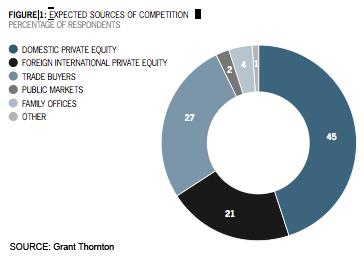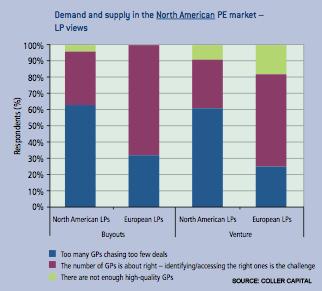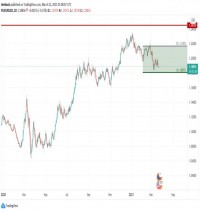|
Private equity's reputation in the US may be on the decline, but international firms are rapidly entering the US market with hopes to overtake the industry. Bailey McCann 
Last month, we discussed the impact that the US Presidential election and specifically, Mitt Romney's candidacy had on the reputation of private equity in the public consciousness. Even though the votes have been cast, and the US and indeed the rest of the world is more focused on the fiscal cliff, private equity still finds itself with an image problem. At the end of November, the industry was implicated, perhaps unfairly, as part of the problem in the collapse of poorly managed Hostess. Other articles have noted the shift happening within the structure of firms away from pure play private equity into more broad based asset management or alternative investment firms - further adding to the confusion. Now, new data shows that even while US firms work on all of these issues, international competition is snapping up key deals in the US and abroad. Structures and products As this publication noted in its first issue, firms that might once have been considered pure private equity are diversifying into other business lines. Some are now offering hedge funds, closed-end funds, or business development companies as a means of drawing new capital and opening up new investment opportunities. While this may be great news for general partners and their investors, it further underlines the need for improved education to investors and the public about what each of these structures mean. Changes in regulatory requirements in the US have also forced private equity firms to register with the Securities and Exchange Commission (SEC), making it much more difficult for firms to stay off the radar. These factors, coupled with growing transaction sizes, and the trend toward dividend recapitalization ahead of new tax rates, make it seem like the spotlight on private equity is here to stay. A piece in the New York Times quoting Richard Trumka, president of the A.F.L.-C.I.O, summed up the populist view, "what's happening with Hostess Brands is a microcosm of what's wrong with America, as Bain-style Wall Street vultures make themselves rich by making America poor." The Hostess debacle added shelf life to an idea that emerged during the Presidential campaign - that something could be "Bained." The piece notes rightly that Ripplewood - the private equity firm involved in the Hostess collapse, neither got rich quick, or mimicked Bain in any real way. Yet, the perception is important. Attack ads during the election looked at the communities in the US that had been Bained too. What does this mean for the industry, in the new era of regulation and transparency? Why is private equity so loathe to point out the benefits it provides to the broader economy? Perception has a way of becoming reality. As the specter of getting Bained takes over for an aging Gordon Gekko in the pantheon of finance archetypes that are simultaneously hated and glorified, it falls to the industry to offer a counterpoint. So far, not much of one is emerging. But, that may change if international private equity firms have anything to say about it. North America's global competition is rapidly becoming the new face of the industry. Here comes everybody Private equity firms in the United States are facing increased competition from foreign and international firms for investment opportunities within the U.S. market, according to the 2012 Global Private Equity Report by Grant Thornton International. 43% of global respondents to the survey plan to open an office in North America within the next two to three years."North America, and the United States specifically, is a far more mature investment market than others around the world, so it's not surprising that there is increased interest from global PE firms to invest here," said Carlos Ferreira, a partner in Transaction Advisory Services of Grant Thornton LLP. "PE firms here have to realize that they're not the only ones invited to the show-they are going to have to figure out a way to thrive despite this growing competition from foreign investment firms." Another telling statistic in the survey was this - 65% of North American respondents believe the image of their industry is deteriorating. Whereas half of respondents in the MENA region see their image as improving as private equity gains a greater foothold in that area and the firms based there make a global reputation for themselves. The majority of MENA and BRICs firms represented in the survey indicated that they are looking for global - read North American investment opportunities and plan to open offices here. This image problem could have a material impact on the fundraising lifecycle for US private equity firms. According to the survey, in 2012 40% of respondents said that their next funds would be majority funded by first time investors. That's up from 24% in 2011. These first time investors may be less willing or able to look past questions over image. Some leading indicators like Cerebus announcing its interest in selling Freedom Group in the wake of the Newtown Massacre show an awareness of this perception problem. North American LPs circle the wagons 
Adding to this troubling news, another data point in the survey shows that two thirds of North American LPs believe that the weakness in IPO markets is not purely cyclical but is partly a structural phenomenon - a worrying prospect for private equity in the long term. Still, GP's do hold some good cards. 38% of investors said they would back GPs on a deal-by-deal basis, looking beyond the traditional fund-investing model. 80% of investors in the survey also expect returns of 11+% from their private equity investments - giving private equity a fairly significant edge over other asset classes. Whether it's enough of an edge to leave the image question unanswered, remains to be seen. | |
|
This article was published in Opalesque's Private Equity Strategies our monthly research update on the global private equity landscape including all sectors and market caps.
|
Private Equity Strategies
North American Private Equity Firms Facing New Global Competition |
|





 RSS
RSS










